No Dog Shampoo: What Can I Use? (Real Alternatives)
Phoebe Buffay may have loved a smelly cat, but there’s no need to lose your sleep over a dirty dog and no dog shampoo. Some days you can run out of dog shampoo or you may not have any available.
Wondered what you could use instead?
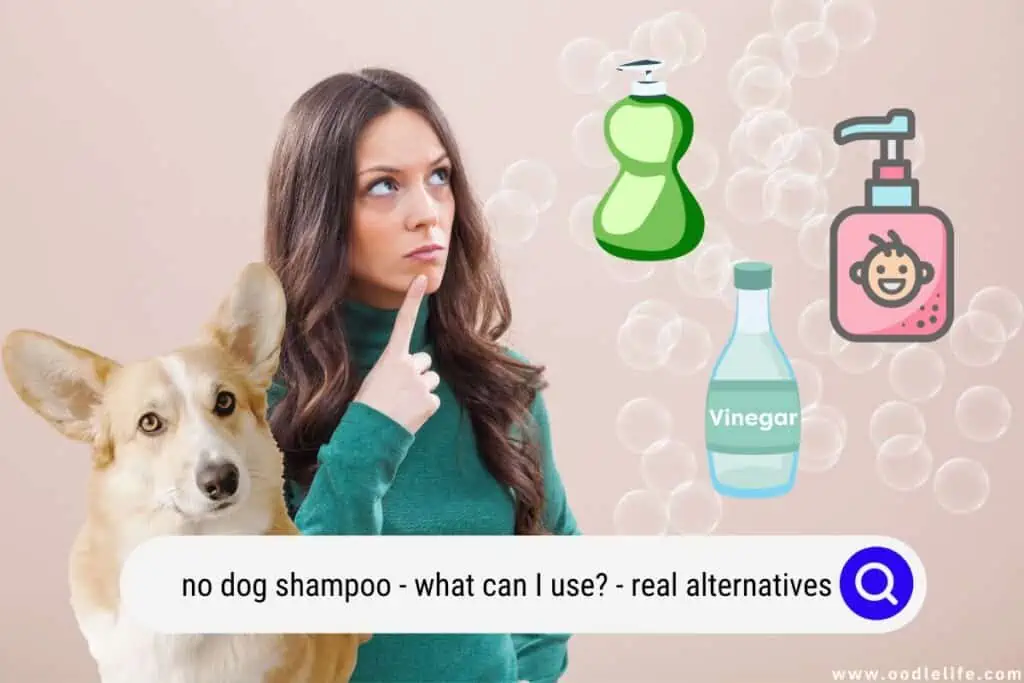
Here are a few tried and tested alternatives to the typical dog shampoo that you could use to give your shaggy a scrub down.
What Are Some Alternatives to Dog Shampoo?
Some of the more common alternatives to dog shampoo include unassuming kitchen ingredients like dish soap, oatmeal, cornstarch, and baking soda. Even baby shampoo could suffice at times.
Just make sure to carefully read the ingredients before using any product on your dog. Some may contain harmful chemicals.
To err on the side of caution, make a quick phone call to your dog’s veterinarian first to check what they recommend.
Alternative 1: Dish Soap
Surprise, surprise! When you unexpectedly run out of dog shampoo, Dawn dish soap is a very convenient, inexpensive, and handy substitute you can use. It is particularly useful to get grease off your pupper.
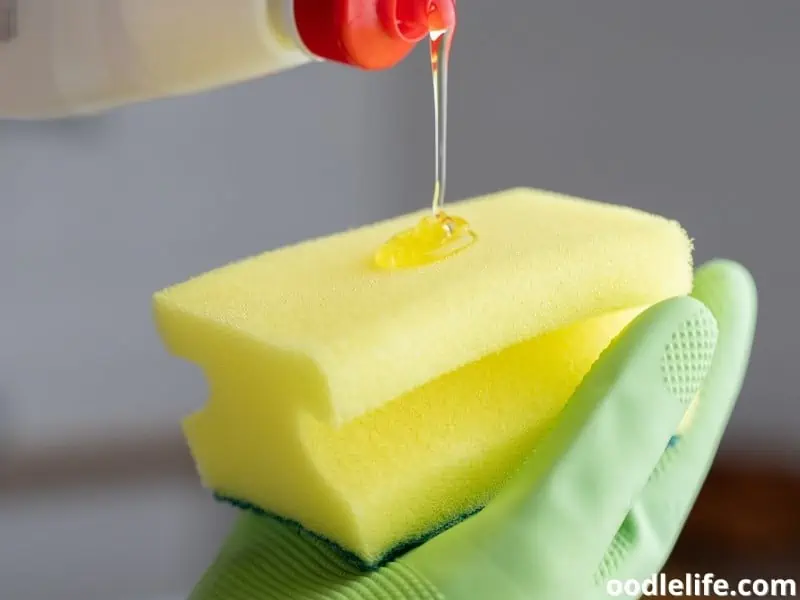
Here’s how to use it:
1. Wet your dog down with warm water.
2. Apply a generous amount of dish soap to their fur.
3. Work it in well, making sure that your dog’s lathered up.
4. Rinse thoroughly with warm water to avoid any possible skin irritation.
5. Dry your dog off with a towel.
And that’s it. You’re ready to play or snuggle with a clean, fresh-smelling pup.
But exercise enough precaution to ensure your Fido does not ingest any of the dish soap and none gets into its eyes. Never make it a practice to wash your dog with Dawn dish soap, use it only as an emergency measure.
Alternative 2: Baby Shampoo
If you are running low on dog shampoo, but still want to keep your dog clean and smelling good, using baby shampoo can be a temporary solution. Just be aware that not all baby shampoos are safe for dogs; some may even have harmful chemicals.
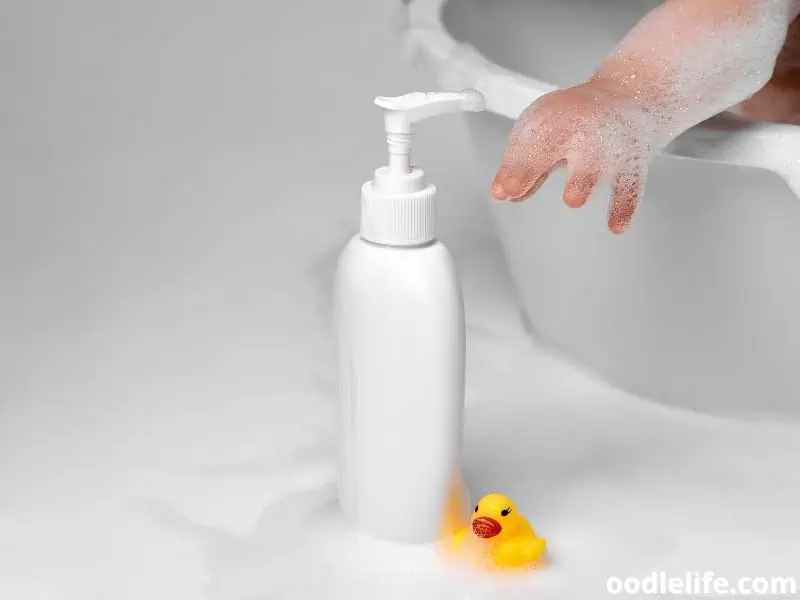
Here is how to use baby shampoo on your dog:
1. Wet your dog’s coat liberally with water.
2. Pour about a tablespoon of baby shampoo into your hand and work it into a lather. You may also want to dilute the shampoo with enough water to make it spreadable.
3. Rub the shampoo into the dog’s coat, working from the top of its head down to its feet.
4. Leave your pet shampooed for about two minutes, then rinse it off thoroughly.
5. Finish with a dry brush.
Baby shampoos sans added fragrances work the best for dogs.
Alternative 3: Apple Cider Vinegar
If you’re looking for a gentler, more natural way to clean your dog’s coat, you may want to use apple cider vinegar over baby shampoo or dish soap.
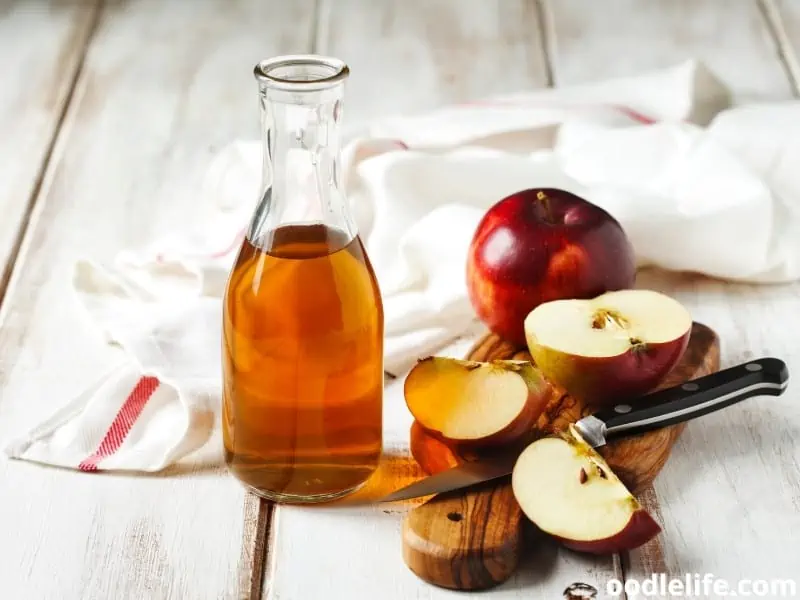
Apple cider vinegar (ACV) is a fantastic shampoo alternative for dogs because it’s rich in antioxidants and enzymes that break down oils and debris. Because ACV is acidic, it can also help to remove a build-up of bacteria and fungus on your dog’s skin. This helps reduce inflammation, fight foul odors, and treat dry skin.
Here’s how to use apple cider vinegar as a dog shampoo:
1. Make a solution by mixing 1 tablespoon of apple cider vinegar with just enough water.
2. Rinse your dog’s coat with warm water and apple cider vinegar mixed together.
3. Massage the ACV mixture into your dog’s coat and leave it on for a few minutes before thoroughly rinsing it off.
Alternative 4: Baking Soda
Baking soda is another great option for gentle shampooing. It’s mildly alkaline, which helps to neutralize the pH levels on your dog’s skin and hair follicles. It has anti-fungal and anti-bacterial properties too.
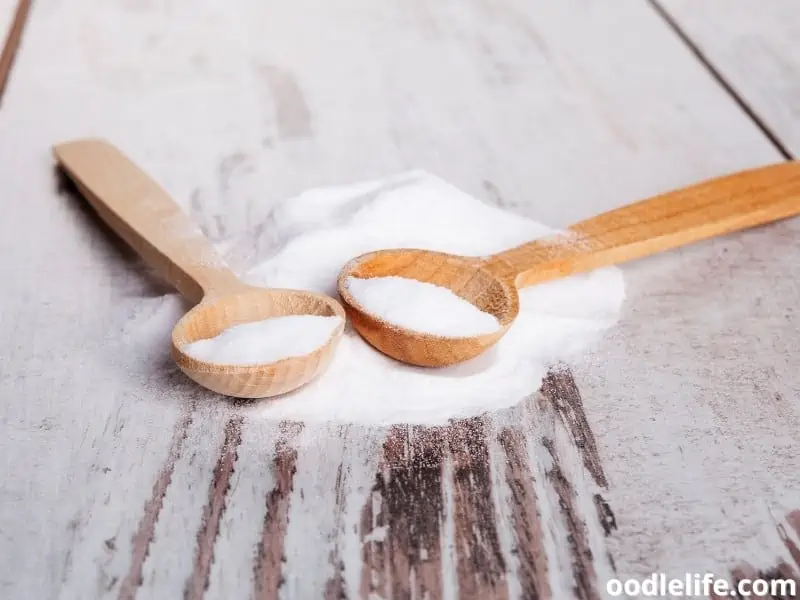
This makes baking soda a natural deodorizer that will leave your dog’s coat smelling fresh and clean.
Here’s how to use baking soda as a dog shampoo:
1. Fill a container halfway with warm water and add ¼ cup of baking soda to make a slurry.
2. Gently massage and soak your dog’s coat in the baking soda and water solution.
3. Rinse your dog’s coat with clean water.
4. Finish by patting your dog’s coat dry with a towel.
Alternative 5: Cornstarch (Mud Bath)
Cornstarch can be used as a mud bath for dogs to help soothe skin irritations, cleanse the coat, and provide relief from hot spots.
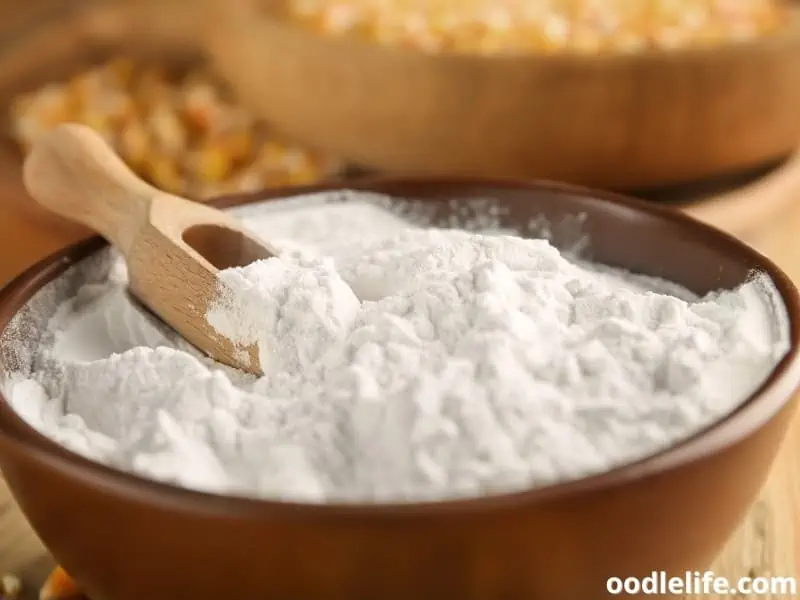
Here’s how to make a dog mud bath out of cornstarch:
1. For a milder solution, mix 1 part cornstarch with 3 parts water and add enough to create a mud-like consistency.
2. Wet your dog down with warm water and apply the cornstarch mixture to its coat.
3. Work the mixture into your pet’s fur and let it sit in the “mud” for 10-15 minutes before rinsing the paste off with warm water.
Alternative 6: Oatmeal
If your dog has sensitive skin, oatmeal is a great alternative to dog shampoo as it is gentle and won’t strip the natural oils from its skin.
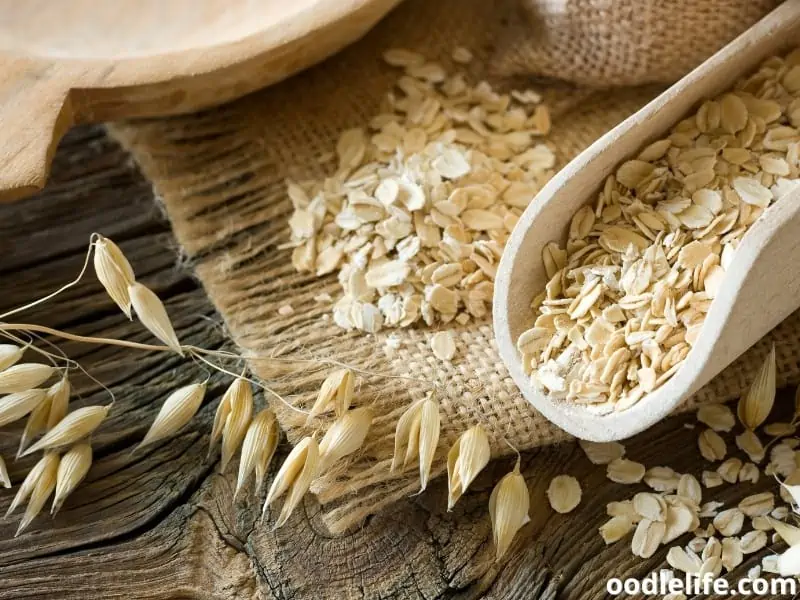
Here’s how to use oatmeal as a dog shampoo alternative:
1. Mix 1 cup of oatmeal with 1 cup of warm water.
2. Apply the mixture to your dog’s wet fur and massage it well.
3. Rinse thoroughly and dry as usual.
One of the great benefits of using oatmeal to clean your dog is that it can help to soothe itchiness and irritation. It can also help to moisturize the skin, making the coat shinier, and softer.
If your dog has any specific skin conditions, always check with your veterinarian before using oatmeal or any other home remedy.
Alternative 7: Rice Wash/Paste
Rice washing is a common hair-cleaning procedure in Japan and other Asian nations. It’s considered to be especially good for people with greasy hair, but that doesn’t mean it can’t be used on your dog’s fur.
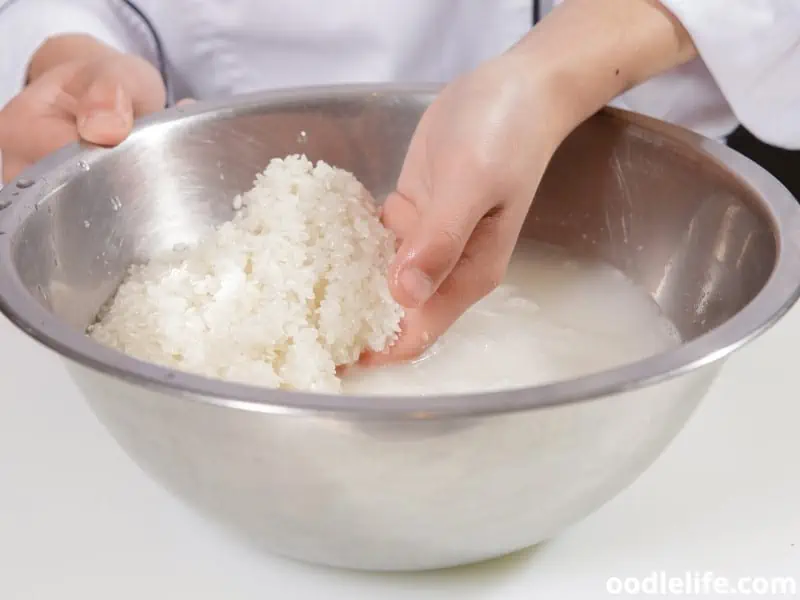
In fact, because it is mild and non-irritating, rice wash is an excellent alternative to dog shampoo. It also has natural antibacterial and anti-inflammatory properties. Hence, it’s safe to use it to clean your dog’s coat, body, and paws.
Here’s how to use rice wash as an alternative to dog shampoo:
1. Wet your dog’s coat with warm water.
2. Mix 1 cup of rice flour with 1 cup of water to form a paste.
3. Apply the paste to your dog’s coat and massage it in.
4. Rinse your dog’s coat thoroughly with warm water.
Paw Fact: If you want a glossy, silky coat after shampooing, you may also use rice wash as a leave-in conditioner. Just gently massage it into your dog’s skin and coat before brushing and drying.
Alternative 8: Soap Nuts
Soap nuts (Indian soap berries) are another excellent alternative to dog shampoo. They are naturally anti-bacterial and anti-fungal, so they can help to keep your dog’s skin healthy. They are also gentle and hypoallergenic, making them ideal for dogs with sensitive skin.
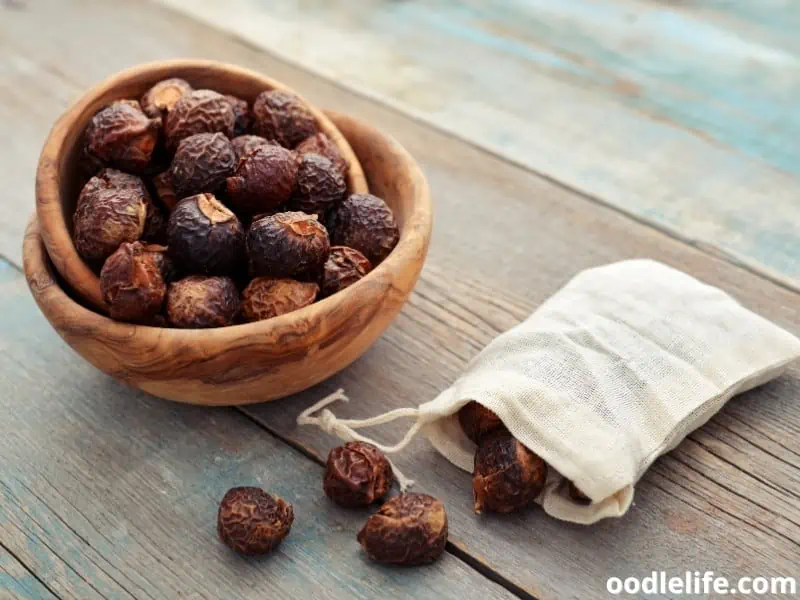
Here’s how to make a dog shampoo out of soap nuts:
1. Boil a handful of soap nuts in water for about 15 minutes.
2. Strain the soap nuts and add them to a blender with a cup of water.
3. Blend until the soap nuts are broken down and the mixture is frothy.
4. Rub the mixture into your dog’s wet fur and rinse thoroughly.
Paw Fact: In addition to their cleansing properties, soap nuts contain insect-repellent characteristics, making your pets less prone to parasites such as fleas, ticks, and lice.
Alternative 9: Dog Wipes
Many pet parents consider dog wipes to be lifesavers. They come in different scents and formulas and can be used to clean your dog’s coat, face, and paws. Some dog wipes are also safe for use on human skin, making them a versatile product for cleaning up after your dog.
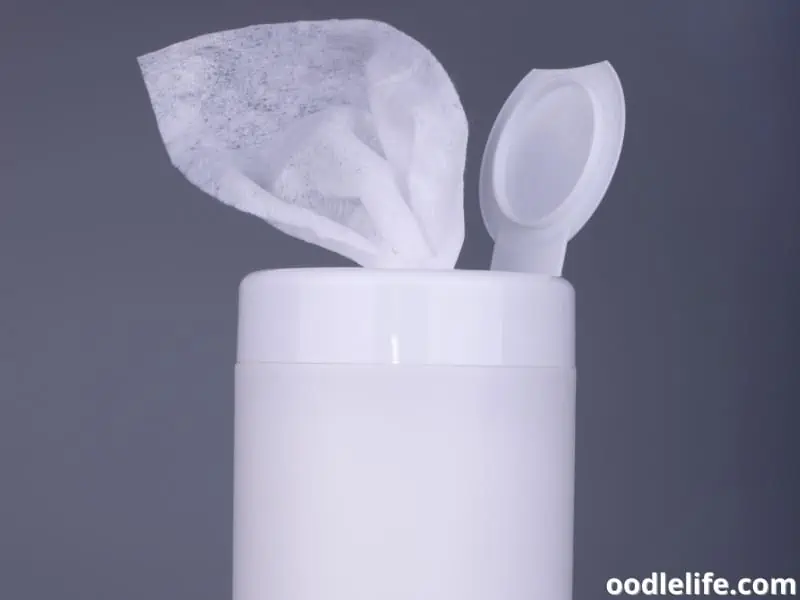
So if you’re ever in a bind and need to quickly clean your dog’s coat, having some trusty dog wipes stashed on your table will do. Just grab a few sheets, and wipe your fur baby’s coat clean.
Dry Alternatives to Dog Shampoo and Bathing
There are a few alternative methods for keeping your pup clean that don’t require any water or shampoo. One popular method is using dry shampoo specifically designed for dogs. Applied directly to their fur, rub it in, and brush it out.
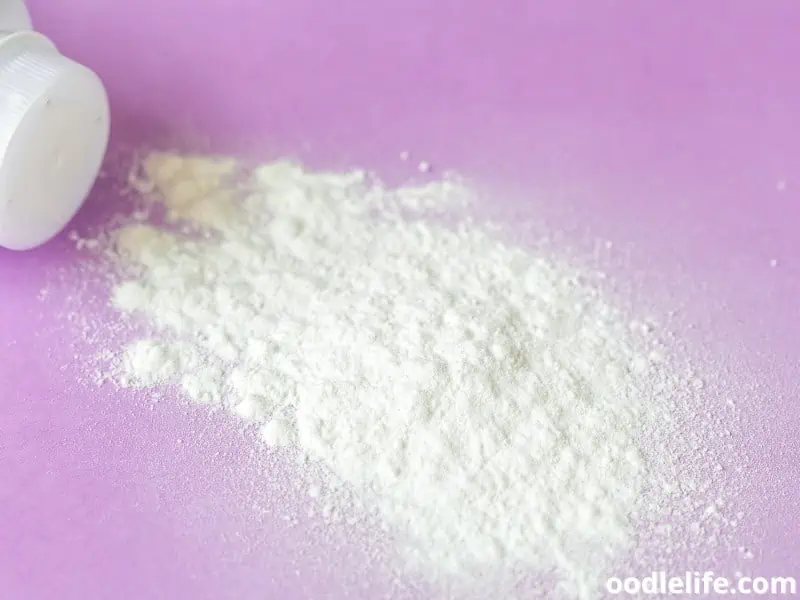
Another similar method is to use baby powder. It doesn’t have the same cleansing properties, but it will help to absorb any excess oils and odors. For both of these methods, be sure to avoid the face and eyes.
If you’re looking for something a little more natural, you can try using cornstarch. Simply rub it into their fur and let it sit for a few minutes before brushing it out. You can also mix it with a little bit of water to form a paste, which can then be applied and left to dry before being brushed out.
These methods are great for spot-cleaning or if your dog doesn’t need a full bath.
Important: When using any of these alternative methods, be sure to start with a small amount and work it up as needed. You don’t want to end up with a powdery mess, or worse, irritate your dog’s skin.
Ingredients to Avoid When Looking for a Dog Shampoo Alternative
There are a few key ingredients you should always avoid using on your dog.
Read the label carefully and do some research to make sure you are choosing a product that is safe and gentle for your dog’s skin.
And, avoid the following:
Sodium Lauryl Sulfate (SLS): This is a common detergent and surfactant found in many shampoos and other cleansing products. It can be harsh on the skin and cause irritation.
Propylene Glycol (PG): This is a petroleum-based ingredient that is often used as a moisture-carrying agent in cosmetics. It can be drying to the skin and may cause irritation.
Artificial Fragrances: Many home products contain artificial fragrances that can be irritating to the skin. If possible, choose a product that is fragrance-free or that uses natural essential oils for scent.
FAQs
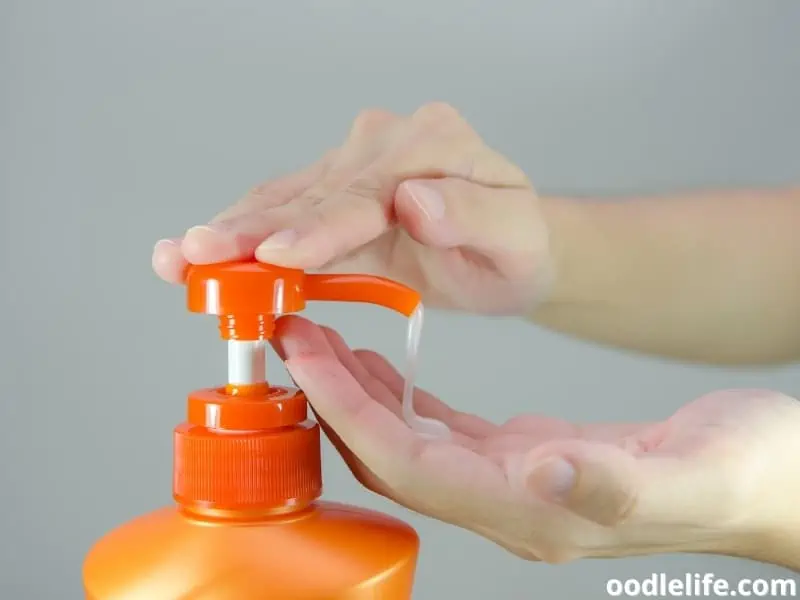
1. Can I use regular shampoo for adults on my dog if I don’t have any of the above?
Even if it’s labeled hypoallergenic, we strongly advise against using human shampoo on your pet. Remember that the pH level formulation of your regular shampoo may be harmless to you, but not to your fur baby. This could cause your dog’s skin to become dry and itchy, as well as strip its skin of moisture.
2. But you added baby shampoo to the list. What makes that any different?
Although baby shampoos have a milder formula, they are just another quick substitute if you run out of dog shampoo. It’s not intended for everyday use. A soap made from natural ingredients, such as herbs or plants, would be a safer substitute.
Again, it’s best to err on the side of caution by getting your vet’s opinion first.
3. Can I substitute ordinary vinegar for ACV?
Yes. Vinegar is a natural cleaner with antibacterial properties.
To wash your dog, mix 1/4 cup of white vinegar with enough water to make a full bath. Sponge your dog down with the mixture, then rinse off. Be sure to avoid the eyes and nose, which should be flushed with fresh water.
4. Can I make my own homemade dog shampoo for future use?
Absolutely! While many high-quality natural dog shampoos are available on the market, they can be expensive. So if you’re looking for a more affordable option, there are several DIY recipes that you can make at home.
Just make sure your pet’s vet approves them first.
Some natural products to consider for your dog’s homemade shampoo are essential oils, rosemary, vanilla, castile soap, glycerin, and pine tar.
5. I happen to have all of those mentioned above; how can I decide which is best for my dog?
One of the first things to consider when choosing an alternative to dog shampoo is the ingredients. Many commercial products contain harsh chemicals that can be drying and irritating to your dog’s skin. (Refer to the above-mentioned list of ingredients to avoid).
You’ll also want to think about the type of coat your dog has.
Some dogs have very sensitive skin, while others have thick, coarse coats. But if your dog has a dry coat, you’ll want to avoid using products with ingredients that could strip the natural oils from your dog’s coat. Additionally, if your dog has sensitive skin, look for alternatives that are free of potential irritants like fragrances or dyes.